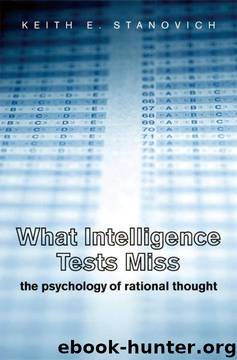What Intelligence Tests Miss: The Psychology of Rational Thought by Keith E. Stanovich

Author:Keith E. Stanovich [Stanovich, Keith E.]
Language: eng
Format: epub, mobi
Tags: 益书网www.kindbook.cn
Published: 2009-02-02T21:41:00+00:00
T W E L V E
How Many Ways Can Thinking Go Wrong?
A Taxonomy of Irrational Thinking Tendencies
and Their Relation to Intelligence
Behavioral economics extends the paternalistically protected category of "idiots" to include most people, at predictable times. The challenge is figuring out what sorts of "idiotic" behaviors are likely to arise routinely and how to prevent them.
-Colin Camerer and colleagues, University of Pennsylvania Law Review, 2003
or decades now, researchers have been searching for the small set of mental attributes that underlie intelligence. Over one hundred years ago, Charles Spearman proposed that a single underlying mental quality, so-called psychometric g, was the factor that accounted for the tendency of mental tests to correlate with each other.' Few now think that this is the best model of intelligence. Proponents of the Cattell/Horn/Carroll theory of intelligence, Gf/Gc theory, posit that tests of mental ability tap a small number of broad factors, of which two are dominant. Some theorists like to emphasize the two broad factors, fluid intelligence (Gf) and crystallized intelligence (Gc), because they reflect a long history of considering two aspects of intelligence (intelligence-as-process and intelligence-as-knowledge) and because we are beginning to understand the key mental operationscognitive decoupling-that underlie Gf. Other theorists give more weight to several other group factors beyond Gf and Gc that can be identified.
Regardless of how these scientific debates are resolved, it is clear that a relatively few scientifically manageable cognitive features underlie intelligence, and they will eventually be understood. Rational thinking, in contrast, seems to be a much more unwieldy beast. Many different sources of irrational thinking and many different tasks on which subjects make fundamental thinking errors have been identified. I have detailed many of these in Chapters 6 through 11, but I have not covered them exhaustively. There are in fact many more than I have room here to discuss? Recall my earlier argument that rational thinking errors are multifarious because there are many ways that people can fail to maximize their goal achievement (instrumental rationality) and many ways that beliefs can fail to reflect reality (epistemic rationality).
Rational thinking errors appear to arise from a variety of sources -it is unlikely that anyone will propose a psychometric g of rationality. Irrational thinking does not arise from a single cognitive problem, but the research literature does allow us to classify thinking into smaller sets of similar problems. Our discussion so far has set the stage for such a classification system, or taxonomy. First, though, I need to introduce one additional feature in the generic model of the mind outlined in Chapter 3.
Serial Associative Cognition with a Focal Bias
Figure 12.1 updates the preliminary model of the mind outlined in Chapter 3 with the addition of one new idea. Previous dual-process theories have emphasized the importance of the override function-the ability of Type 2 processing to take early response tendencies triggered by Type I processing offline and to substitute better responses. This override capacity is a property of the algorithmic mind, and it is indicated by the arrow labeled A in Figure 12.
Download
What Intelligence Tests Miss: The Psychology of Rational Thought by Keith E. Stanovich.mobi
This site does not store any files on its server. We only index and link to content provided by other sites. Please contact the content providers to delete copyright contents if any and email us, we'll remove relevant links or contents immediately.
The Art of Thinking Clearly by Rolf Dobelli(8842)
The 5 Love Languages: The Secret to Love That Lasts by Gary Chapman(8497)
Mindhunter: Inside the FBI's Elite Serial Crime Unit by John E. Douglas & Mark Olshaker(7834)
Becoming Supernatural by Dr. Joe Dispenza(7106)
The Road Less Traveled by M. Scott Peck(6635)
Nudge - Improving Decisions about Health, Wealth, and Happiness by Thaler Sunstein(6633)
Enlightenment Now: The Case for Reason, Science, Humanism, and Progress by Steven Pinker(6405)
Win Bigly by Scott Adams(6311)
Mastermind: How to Think Like Sherlock Holmes by Maria Konnikova(6236)
The Way of Zen by Alan W. Watts(5800)
Factfulness: Ten Reasons We're Wrong About the World – and Why Things Are Better Than You Think by Hans Rosling(4021)
The State of Affairs by Esther Perel(3927)
Gerald's Game by Stephen King(3918)
Man's Search for Meaning by Viktor Frankl(3634)
The Confidence Code by Katty Kay(3566)
Thinking in Bets by Annie Duke(3531)
The Worm at the Core by Sheldon Solomon(2917)
Enlightenment Now by Steven Pinker(2917)
Liar's Poker by Michael Lewis(2812)
